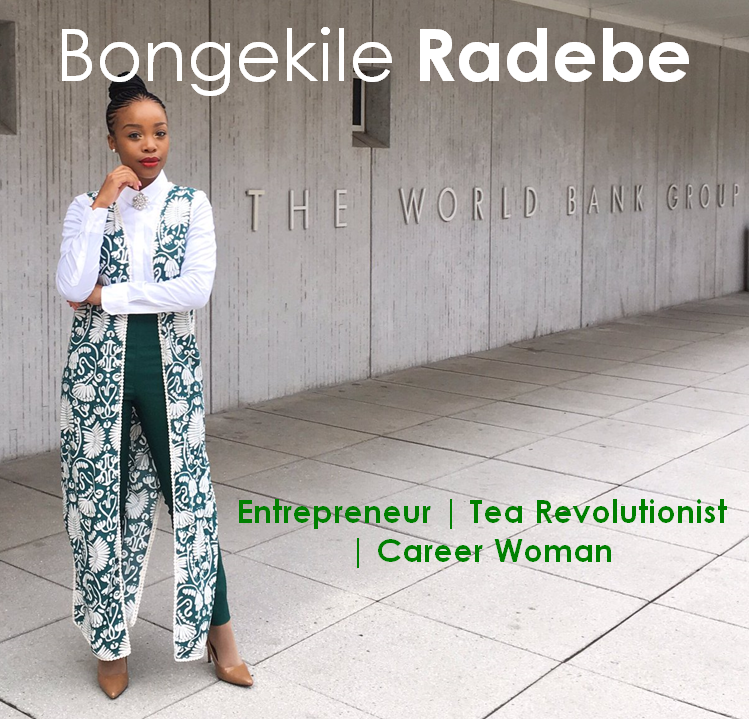The University of the West Indies, Cave Hill Campus – the Institute for Gender and Development Studies: Nita Barrow Unit (IGDS: NBU) presents 16 Days of Activism Against Gender-Based Violence Campaign.
A BRUTAL SOCIETY
As the title of this article suggests, I have in recent days, following the overwhelming non-ending events that relate to the inhumane treatment of children and female adults alike, resorted to referring to this society in which we exist as a brutal one. Much as many of us would like to conceive and start our own families, it is such a scary thought to have your children exist in such a cruel world with monster-like humans.
As many of you would know about the recent #MeToo trend on social media where essentially victims of abuse and particularly rape, were coming out and speaking out about their personal incidents of abuse. I came across a particular thread on Facebook relating to this hashtag and what I found extremely appalling in that thread is that not even a single victim that came out mentioned a stranger as their perpetrator, it was people they knew, people whom they would expect protection and love from. Many men want to argue that women and girls make themselves vulnerable to rape by the way they dress and I hold a view that this narrative is absolute nonsense, men need to take NO! for what it is and know that they are not entitled to female bodies. These bodies are personal and not commodities and the sooner everyone acknowledges and appreciates that, the better for our society.
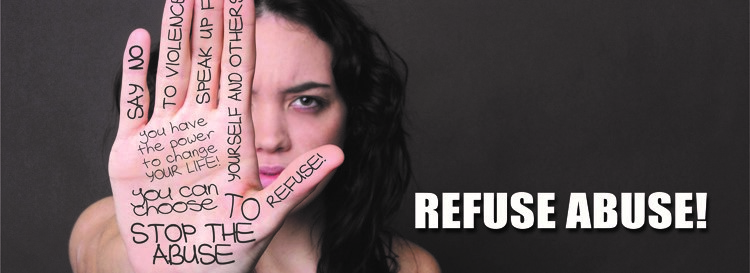
Rape is but one of the ways in which women and children are oppressed on a daily basis but there are other ways. Many women live in fear each and every day because of the conduct of their partners who are advocates of patriarchy and do not want to be called out on their behaviour. These men feel so superior that the women they are with are not entitled to any views but rather are subjected to whatever the men say, which is wrong. These women often don’t speak out because they have been oppressed for so long that it’s almost become a norm to them, it also gets difficult for the women to speak out if they financially depend on these men, which is often a situation these men create deliberately so that the women can be vulnerable, for the satisfaction of their egos.

A reasonable amount of work is being done to empower women and young girls, but my cry with this approach is that despite the fact that it is very necessary, it will not be as effective if we choose to only focus on one gender group and ignore the other, and then hope to transform society for we would be delusional if we do so. I genuinely believe it is time for all of us to come together and have these dialogues because what I find is that everyone – black, white, young, old, male and female needs this empowerment that is so often talked about, we all need it to be better and to ultimately and ideally reach common ground where these pressing societal issues are concerned.
Finally, we need to stop hurting each other, we need to stop causing each other pain, and we need to be kind to one another. Cruelty has no place in this society, patriarchy cannot prosper where we intentionally seek to make peace. All of this needs to stop, it must just stop!
AUTHOR’S BIO
Noko Prudence Rakoma is a 20 year old passionate speaker and blogger who is also a student, she is the founder of an organisation called Kgoshigadi Reign which essentially seeks to empower society through having having conversations. Noko is also a young entrepreneur who co-owns a hair business called Queendom’s Castle Hair.
Lily Banda on talking about violence against women…
Born in Malawi on 16 August 1990, Lily Banda made an impact under the stage name Alex as a singer and poet. Since the release of her debut album in January 2014 the artist has headlined many events where she has dazzled audiences with her charisma and energy as well as the boldness of her poetry.
Watch as she talks about violence against women #StopViolenceAgainstWomen&Children
Ending Violence against women and girls, if not you, then who?….
This November, 2017, Mbewu Movement would like to encourage the Mbewu community to participate in the discussion and conversation around violence against women and girls.
Ndumiso: LUV ”love” story Part 3
A talented photographer and director, Ndumiso Sibanda compiles a 3-part love short story. Watch the final part that this talented artist pulled off.
Ndumiso: Luv Story Part 2
A talented director and professional photographer, Ndumiso Sibanda, pulls of an amazing LUV ”love” short story, take a look at this talented artist’s love story compilation.
Vongani – Groceries Series
Is It Possible To Buy Groceries At No Cost?
A buyer’s journal to secure additional wealth.
Author: Vongani Nkuna
Several years ago, I opened a stock brokerage account at a reputable firm. I deposited a few thousand and then, as a natural result of exploring other interests, I let it roost.
Month after month a statement from the broker would show up in my inbox. In it, the only activity would be the broker’s collection of monthly administration fees and the interest earned on the account balance.
The interest earned would offset the fees by a modest margin, fostering steady growth on the original deposit. This is normal of interest earning accounts that carry a decent positive balance; after all, the interest would compound monthly whilst the fees were generally fixed over long intervals.
With increased curiosity, I closely watched this mundane trend of income from a financial asset (when held in generous sums) running, almost in leaps and bounds, further ahead of its fixed costs.
Mundane as the trend was, it lead to my belief that its likely, in the long-term, my spending costs will be surpassed by income earned from the corporations wherefrom those costs originate, provided I own sufficient dividend earning shares and the corporations have some measure of financial soundness.
In other words, if chunks of my monthly budget is used to buy from a chosen corporation, shouldn’t I (where viable) try to own as many shares of that corporation as possible so that at some point the income renders my buying cost-free, so to speak?
Approaching it more broadly, if I generally spend in a particular industry, shouldn’t I have exposure to some of the corporations in that industry, for the cited outcome?
Convinced I was on to something, I got carried away…If I considered myself poor, wouldn’t this, in the long-term, bring an end to my poverty, or at least break the cycle for my family and the generations to come?
The latter notion may be somewhat far-fetched but I fantasised about the possibility and tranquillity of absolute financial freedom and its quietening effect.
After buying shares and earning dividends from the corporations of our patronage, the Nkuna Groceries Project http://www.nkunagroceries.co.za seeks to discover the point at which we’ll deem our historic grocery purchases, cost-free. It’s a public experiment and a practical response to the questions I’ve been asking myself.
The project is virtually a journey of a thousand miles and, to accommodate our shoestring budget and any interested persons, we started at the laughable first step.
There are two project-owners, the principal and the assistant. Each invests up to 20% (total 40%) of our past grocery spend in the shares of grocery corporations at which we buy from.
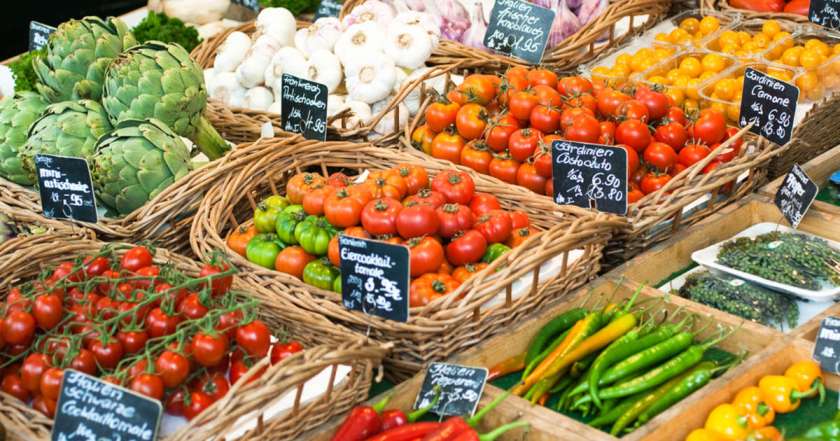
Shares are purchased from time to time as grocery bills accumulate: We pick dividend payers that demonstrate some level of good health.
The nature of the project drives the grocer into an unofficial, but unavoidable ‘cash-back’ policy with the customer as a result of the cash dividend.
For interest’s sake, if I wanted an immediate 100% ‘cash-back’ on the latest dividend from Pick n Pay Stores Ltd (a corporation we own) the point of cost-free purchases would roughly be at the convergence of these figures…
Our Groceries Costs: R26 419.85, from May 2016 to May 2017
Latest Dividend per Share: R1.464, final dividend with a record date of 9 June 2017
Estimated After-Tax Dividend per Share: R1.171
Minimum Number of Shares Required: 22 562
Share Price (close): R60.75, day before last day of trade in order to earn dividend
Minimum Cost of Shares excl. Fees and Charges: R1 370 641.50
Estimated Dividend: R26 420.10
We, unfortunately, didn’t have R1.37 million disposable to buy the requisite number of shares to achieve instant gratification as far as cost-free groceries (using this method) are concerned; we must, therefore, endure the long haul.
Since dividends come after a period of inflationary corrosion, it would make sense to buy more shares to achieve inflation-adjusted cost-free purchases.
The chart below shows the project’s gross totals since inception in May 2016 to June 2017.
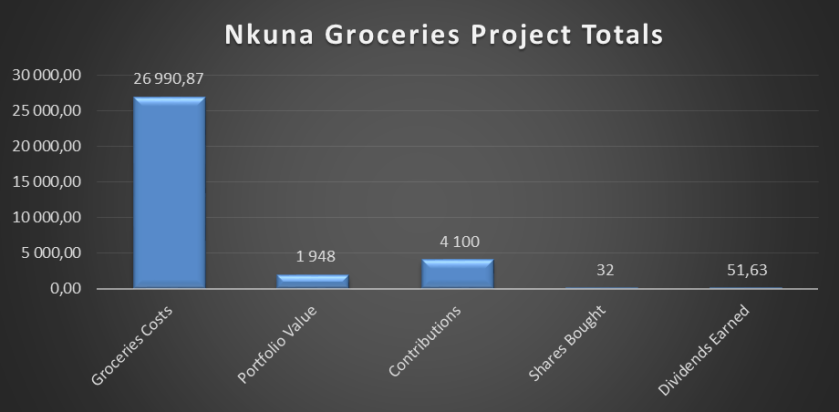
Things are still embryonic and although it seems an impossible feat looking at current figures, I expect a single financial period’s inflation-adjusted Dividends Earned (bar) to wipe-out total Groceries Costs (bar) at some point in a generation or two, if not sooner.
Until then, any Dividends Earned (bar) are referred to as unofficial partial cash-backs, as seen with the latest scanty pre-tax dividend of R51.63; an insignificant cash-back against the total Groceries Costs (bar) of R26 990.87.
The recorded dividend is not adjusted for inflation and, at the moment, it’s completely consumed by brokerage costs.
I make no mention of capital growth from rising share prices; this, together with adequate Dividends Earned (bar), would raise the Portfolio Value (bar) above our capital Contributions (bar) at the broker. After transaction fees and charges, a liquidation of all our 32 shares now, would result in a loss based on the difference between Contributions (bar) and Portfolio Value (bar).
It’s all good and well if share prices rise, but our generational outlook silences the noise of price fluctuations. Plummeting or “bargain basement prices” are more favourable for our downward cost averaging. Besides, this is largely a contest between costs and dividends.

We do, however, only intend to sell shares for a princely profit.
I admit, I wouldn’t off load my other holdings to make way for this operation. This is nothing more than a calculated manoeuvre in my investing playbook.
As a value investor at heart, this assignment forces me to buy shares outside my criteria of comfort. In times of adversity, these shares may fold, therefore, this operation will always be the bridesmaid never the bride.
There is, however, and you may have sensed, this stern capitalist thought hidden between the lines: Why should I contribute to the other’s wealth by circulating my money – of my potential future wealth – for the other’s short-term wares that carry limited long-term benefit for me?
I want to deal with this thought in more detail later.
Author’s biography
Vongani Nkuna
Vongani is a passionate self-taught value investor at large who owns a proprietary investing company, Nkuna Equity (Pty) Ltd. He graduated from advertising school with a diploma in copywriting, but never used his qualification in industry. Instead, his fascination with the stock market lead him to join commodities trading companies such as Trafigura where he learned more about the commodities and financial markets over and above his own informal learning initiatives. He created the Nkuna Groceries Project that seeks to promote one’s investing habits by taking advantage of one’s spending habits.
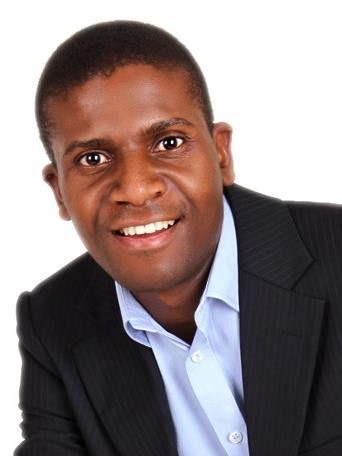
Ndumiso: Luv Story Part 1
Mbewu MCM – a talented director and professional photographer, Ndumiso Sibanda, take a look at the LUV ”love” short story series that this talented Afrcan artist has pulled off.
An interview with Bongekile Radebe: On Being Her Own Cup of Tea
In 2015 I was asked to participate in a panel discussion at the Youth Economic Indaba hosted by the Association of Black Securities & Investment Professionals (ABSIP). My particular panel was themed around women empowerment, and I was so honoured at the opportunity to share my thoughts amongst an accomplished group of young women. One of the things I remember fondly about this experience was the connection I had with the panel moderator- Bongekile Radebe. She was sharp, accomplished (from a very young age) and, immediately after our engaging panel debate was over, our common surname compelled me to call her Ma Bhungane (isithakazelo saka Radebe) which led to an exchange of kind, knowing smiles. Since then Bongekile has been on the path to world domination! When we first met, she was the founder of an organization called Her Destiny, a social business that created a platform for empowering conversations amongst women, related to connecting generations, personal development and financial literacy. But at the heart of all these conversations was tea, which was the consistent beverage served at each of her meetups. It was only a matter of time until Bongekile began to connect the dots to a more sustainable, impactful business model and an audacious aspiration. Her big idea- starting her own premium tea product called, “Taste of Legends”. This pivoted her passion project from being a social initiative into a health, wellness, lifestyle and agricultural enterprise.

Photo Source: @tasteoflegends
MG: So, you have a finance and banking background, and pivoted into starting a tea business. How did you approach the learning process in starting your business, especially since you had no experience and many of your large competitors have been in this game for ages?
BR: It took a good two years to develop my tea product, but I took my time because I didn’t want my tea to be just another tea product. I really wanted my tea to carry the vision of women and communities coming together to connect and learn. Hence the brand name “Taste of Legends”, which represents the various parts of the vision I was aiming to create. The brand name, the package design everything in between was all intentional and I didn’t want to rush this process. Fortunately, had a very good understanding of the things I didn’t know, and I always want to give my best in what I do, so I knew the most effective way for me to learn more about tea production was to surround myself with people who were masters in it already. This has especially helped to get the product side of the business working very well. Also, not a day goes by without me reading something related to tea and I had a natural curiosity to find out what the best tea in the world is and why. This has also focused my attention on building a brand that is globally strong and has potential to do exceptionally well somewhere else outside of South Africa. But a key business lesson for me has been being able to think big, and being okay with starting small.
MG: When did you launch your tea product and how has your business grown since?
BR: I launched “Taste of Legends” in August 2017, during SA women’s month, which was great timing considering the significance of the month and the background of my business. It’s now available for purchase on social media, and the website is due to launch soon. However, all the relationships I forged from before launching my own tea product have really pulled through and helped me penetrate the market. I also think the main reason these relationships helped was that they had seen the previous work I’d done and trusted that I could make my business a success. Relationships and the networks one builds over time are so important and should never be underestimated. My biggest client so far has been Brand South Africa.

Photo Source: The Young Independents (2016)
MG: With your global achievements, including being a Mandela Washington Fellow and a One Young World Ambassador, have you always been intentional about wanting to stand up as a businesswoman on a global stage?
BR: I think I’ve always had my intentions in the right place, as opposed to just chasing an accolade. I remember when I was a teenager I used to read magazines and look up to these women who were my definition of success. At the tender age of 20, I was on the cover of Destiny magazine’s Power of 40 issue next to Khanyi Dhlomo, which was a small affirmation that started to shape a bigger picture for me and led me to where I am today. I continue to be spiritually aware of this favour and grateful for these building blocks. I consciously believe that I was not called to live an ordinary life, and I know that, in some way or another, my life will be great. I also realise that this comes with added responsibility, which can be very rewarding and also at times very painful. But this all builds deep wisdom and I welcome this as a spiritual experience.

Image Source: Destiny Magazine (2011)
MG: So, what’s next for “Taste of Legends”?
BR: I’m passionate about turning my tea business into a community of legends and people aspiring to achieve legendary work and/or legendary moments. We, as people, have the tendency to be so intensely goal orientated, but tea allows us the opportunity to just take it all in, either in solitude or with the company of others. “Taste of Legends” wants to help its consumers achieve wellness, self-care and we know that this, in turn, helps our consumers be their best and ultimately achieve their goals. I have my own aspirations for the business but I’m also looking forward to the business blowing me away. I’m especially keen to see the business grow in time to uplift the livelihoods of families that we work with. I think it’s excited to live in an age where we can document our journeys, and I dream of the day where I get to say that I am a black, township raised girl, who went on to make the best tea in the world.
Article by: Magcino Gule | Mbewu Movement Founding Member
Magcino Gule holds a Master of Philosophy in Politics, Philosophy and Economics (University of Cape Town). She is an Executive Assistant in Financial Services
“The Golden Stool”…Yaa Asentewa
Source: Youtube

![instasquare_2017101713034126[1]](https://mbewu.wordpress.com/wp-content/uploads/2017/11/instasquare_20171017130341261.jpg?w=151&h=151)

